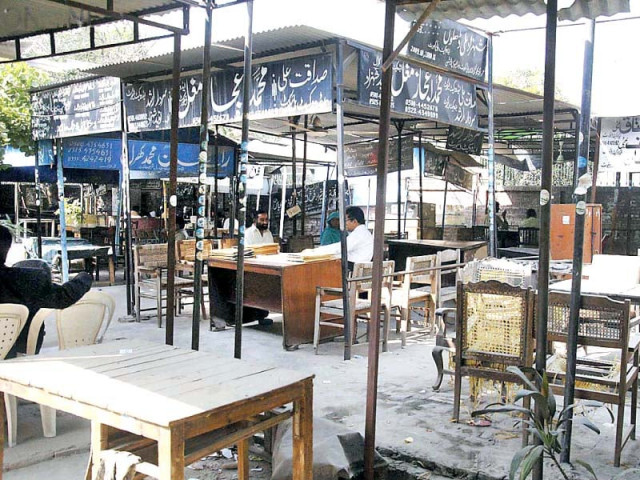Court boycott: Five years on, lawyers observe black day
Recall the time when former president Musharraf declared state of emergency.

Lawyers responded to calls by the Pakistan Bar Council to boycott courts and observe a black day on Saturday, recalling bitter memories of November 3, 2007 when then-president Pervez Musharraf imposed a state of emergency, suspended the constitution and sacked judges.
The legal fraternity of Islamabad District Bar Association (IDBA) and Islamabad High Court Bar Association (IHCBA) held separate general body meetings in which they condemned the actions taken by Musharraf in 2007.
In his message, IHCBA President Syed Nayyab Hassan paid tribute to the lawyers who sacrificed their lives on that day. He also appreciated the media for its role in restoring the judiciary and said he hoped it would continue its struggle to highlight the role of the judiciary. The lawyers also passed a unanimous resolution denouncing the events of November 3.
Lawyers across Punjab observed the black day. The courts bore a deserted look as lawyers observed a complete strike. Black flags were hung on bar rooms and lawyers wore black arm bands to commemorate the day.
Meetings held by lawyers held across the province passed resolutions condemning the actions of the military ruler on this day five years ago. They termed the imposition of emergency by Musahrraf a mini-martial law.
More than 25,000 cases were adjourned in the lower courts of Lahore due to lawyers strike.
The litigants, particularly those coming from suburbs and far flung areas, faced encumbrance. The judicial officers, while sitting in their chambers, simply extended dates for hearings, which provided some relief to those seeking interim bails. Under-trial prisoners, brought to court for their case hearings, were also sent back to jail. Police contingents were present around the courts to ward off any untoward incident.
Vice Chairman of the Punjab Bar Council, Abbas Nissoana and Chairman of the Executive Committee of the Punjab Bar Council, Asif Saeed said that Pervez Musharraf had imposed emergency to undermine the lawyers’ movement for the restoration of free judiciary. They went on to say that Musharaf resorted to unconstitutional and illegal tactics to subjugate the legal fraternity. Lawyers were roughed-up, arrested and even tortured, but they stood firm for their resolve, they added.
In Karachi, lawyers wore black arm-bands and stayed away from the courts proceedings at the City Courts and Malir district courts in response to the call of the Sindh Bar Council. Lawyers in Sukkur boycotted proceedings as well and gathered on the premises of the district sessions court, where they shouted slogans against the imposition of emergency in 2007.
Like other parts of the country, the Peshawar legal fraternity along with lawyers from other parts of Khyber Pakhtunkhwa also observed a black day and wore black ribbons. However, lawyers of the provincial capital, did not boycott court proceedings, terming it as an injustice to litigants who would suffer if lawyers failed to appear for their [litigants’] case hearings.
Media secretary District Bar Association Muhammad Bashar Naveed said the legal fraternity around the country condemned Musharraf’s decision to suspend the Constitution but added that they would not boycott the court proceedings.
“The judiciary is delivering effectively performing its duties, so why should we boycott court proceedings. It would disturb litigants who, number in hundreds and pay daily visits to courts seeking justice,” Naveed said.
Naveed also said that by tying black ribbons around their arms and continuing to do the same thing in the future would show the world that lawyers condemned the decision of the military dictator, which later became the reason for dictators’ defeat.
Published in The Express Tribune, November 4th, 2012.



















COMMENTS
Comments are moderated and generally will be posted if they are on-topic and not abusive.
For more information, please see our Comments FAQ